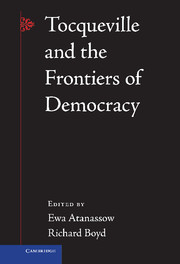Book contents
- Frontmatter
- Contents
- List of Contributors
- Short Title Abbreviations of Tocqueville's Major Works
- Acknowledgments
- Introduction: Tocqueville and the Frontiers of Democracy
- Part One The Meaning of Democracy and the Democratic Revolution
- Part Two Democratization in a Non-Western Context
- Part Three Challenges of Globalization: Democracy, Markets, and Nationhood
- 7 Tocqueville and the Unsettled Global Village
- 8 Nationhood – Democracy's Final Frontier?
- 9 Commerce, Glory, and Empire: Montesquieu's Legacy
- Part Four Democracy, Imperialism, and Foreign Policy
- Part Five Democracy's Old and New Frontiers
- Epilogue: New Frontiers, Old Dilemmas
- Bibliography of Works Cited
- Index
- References
8 - Nationhood – Democracy's Final Frontier?
Published online by Cambridge University Press: 05 April 2013
- Frontmatter
- Contents
- List of Contributors
- Short Title Abbreviations of Tocqueville's Major Works
- Acknowledgments
- Introduction: Tocqueville and the Frontiers of Democracy
- Part One The Meaning of Democracy and the Democratic Revolution
- Part Two Democratization in a Non-Western Context
- Part Three Challenges of Globalization: Democracy, Markets, and Nationhood
- 7 Tocqueville and the Unsettled Global Village
- 8 Nationhood – Democracy's Final Frontier?
- 9 Commerce, Glory, and Empire: Montesquieu's Legacy
- Part Four Democracy, Imperialism, and Foreign Policy
- Part Five Democracy's Old and New Frontiers
- Epilogue: New Frontiers, Old Dilemmas
- Bibliography of Works Cited
- Index
- References
Summary
Tocqueville's first and most celebrated work heralds the irresistible rise of democracy throughout the world. Alongside its striking forecast and prophetic tone, much of the work's originality consists in redefining the nature of democracy. More than a type of political order, in Tocqueville's analytical vocabulary, democracy comes to mean something “altogether new.” It identifies a dynamic state of society that remolds every aspect of communal life along egalitarian lines: not just political institutions and the relationship between rulers and ruled but also social practices, opinions, and values, down to the prevailing mentality and the “manner of thinking and feeling.” Democracy for Tocqueville is at once a comprehensive social condition and a way of understanding the world that shapes a novel human type: a democratic humanity.
Just as Tocqueville expands a time-honored political notion – democracy – to encompass the entire way of life of a society and a new form of mankind, so, too, he transforms a geographical category – the frontier – into a historical thesis. In the “Introduction” to the first volume of Democracy in America, speaking for the perspicacious observers of his day, he proclaims that “the gradual and progressive development of equality is at the same time the past and the future of history.” It is in the New World, moreover, that this progressive development has reached its “extreme limits.” In Tocqueville's account, not only a geopolitical notion, North America comes to signify a historical frontier as well. The New World exemplifies “the new state of the world” – a more advanced historical experience that reveals the character and meaning of the modern age. What defines this new world in the sense of the modern world is equality not simply as established principle but as a “generative fact” – a continuous transformation and ongoing process of equalization of conditions. Brought into broad daylight in the “Christian universe,” this unrelenting democratizing process is not restricted to the Christian West. From its opening pages, Tocqueville's Democracy in America announces the impending global democratic revolution.
- Type
- Chapter
- Information
- Tocqueville and the Frontiers of Democracy , pp. 178 - 201Publisher: Cambridge University PressPrint publication year: 2013
References
- 8
- Cited by

